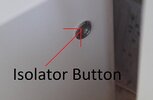Well I probably will, but that doesn't really answer the question
There is no right or wrong. The coding is down to the inspector and I would probably go for a C2 - especially if it’s a rental
You have not answered my question - is this a rental ?
Well I probably will, but that doesn't really answer the question
Why? are tenants more likely to get a shock compared to home ownersThere is no right or wrong. The coding is down to the inspector and I would probably go for a C2 - especially if it’s a rental
You have not answered my question - is this a rental ?
Why? are tenants more likely to get a shock compared to home owners
Yep, the gas is yellow plastic into the property. So no main bonding at all. I would have said the lack of RCD is a C3 as it was done before the regulations changed. But this is beside the point really as you've answered my question - supplementary bonding doesn't rely on main bonding. Thanks all for the repliesBy the way, you say that there is 'no main bonding', and there clearly can't be any bonding of a plastic supply pipe - but do you have a gas supply? If you do, that is very probably 'main bonded', in which case it would not even be true to say that your installation has "no main bonding".
So do some, maybe many, owner-occupiers and their fellow occupants.Lots of tenants do some particularly stupid things , in my experience
My understanding is that plastic gas pipe is not permitted within domestic properties. If it changes from plastic to metal before it enters the property, the metal pipe may (but may not) need bonding.Yep, the gas is yellow plastic into the property. So no main bonding at all.
What change in regulations are you referring to?I would have said the lack of RCD is a C3 as it was done before the regulations changed.
Indeed. You got your answer to that question in the very first response you received (from EFLI in post #2), upon which I expanded a bit in post #8 and, since you asked the question again, I re-iterated my answer in post #14.But this is beside the point really as you've answered my question - supplementary bonding doesn't rely on main bonding. Thanks all for the replies
whether it was done before or after the regs change is completely irrelevant.Yep, the gas is yellow plastic into the property. So no main bonding at all. I would have said the lack of RCD is a C3 as it was done before the regulations changed. But this is beside the point really as you've answered my question - supplementary bonding doesn't rely on main bonding. Thanks all for the replies
M

As said all 230 volt electrics are potentially dangerous, so the C2 can be given to nearly anything. The idea of C1, C2, C3 was to guide the person who commissioned the EICR as to what order to do any upgrades, remember the EICR was never designed to be like an MOT with a pass/fail, it is simply a report as to the condition. Fact the English government decided that C2 was a fail with rental property has nothing to do with how an EICR is done.Thanks John. RCD not present wouldn't be a C2 though surely?
There is no set qualification.“qualified person” means a person competent to undertake the inspection and testing required under regulation 3(1) and any further investigative or remedial work in accordance with the electrical safety standards;
Yeah this one. If your tenant manages to injure themselves on your property the easy way to deflect the ambulance chasing claim firms is to have all the risk reduction installed.So do some, maybe many, owner-occupiers and their fellow occupants.
I suspect that you may not be making you point clearly enough - since that seemed to be that a landlord has a duty of care to tenants which is a little different from the duty of care to himself/herself and family etc.
- since that seemed to be that a landlord has a duty of care to tenants which is a little different from the duty of care to himself/herself and family etc.

In the main I would say no need for RCD FCU or RCD sockets, but I have one RCD FCU and two RCD sockets in spite of having an all RCBO consumer unit.I would caution against adding an RCD FCU just for the bathroom part of a larger circuit (i used to do it) .
 not this
not this  and I think doing an EICR on my own house I would be tempted to list this as a code C2, I look at my flat kitchen and there are 4 wall isolators, plus 2 built into the consumer units, and turn them all off and 2 x twin sockets and a FCU stay live, clearly marked EPS supply, but no instructions on where and how to turn off the EPS supply.
and I think doing an EICR on my own house I would be tempted to list this as a code C2, I look at my flat kitchen and there are 4 wall isolators, plus 2 built into the consumer units, and turn them all off and 2 x twin sockets and a FCU stay live, clearly marked EPS supply, but no instructions on where and how to turn off the EPS supply.That's a very interesting "assumption"The OP seems reluctant to respond to my question so lets work under the assumption that its a rental ...
Only the OP is arguing about the coding. I told him early on that it's entirely down to the opinion/judgment of the person undertaking the inspection and that, as we know, electricians' views vary as to whether it should be C2 or C3.I can't really be bothered to argue with the OP or you either about coding ...
'Competent' or not per some definitions, either of us would be 'allowed' to undertake an EICR, and are entitled to our own opinions and, even if I say so myself, I believe that I would be 'competent' (in an every sense) to undertake an EICR - not that I ever will (other than, effectively, in my own home - which I do regularly)as neither of you are claiming to be a competent person.
Yes and yes - if I felt it necessary.Would you argue with your MOT station or doctor?
What a home owner does or doesn't do in their own home is not my issue.
That's a very interesting "assumption"
If you need to find a tradesperson to get your job done, please try our local search below, or if you are doing it yourself you can find suppliers local to you.
Select the supplier or trade you require, enter your location to begin your search.
Are you a trade or supplier? You can create your listing free at DIYnot Local
